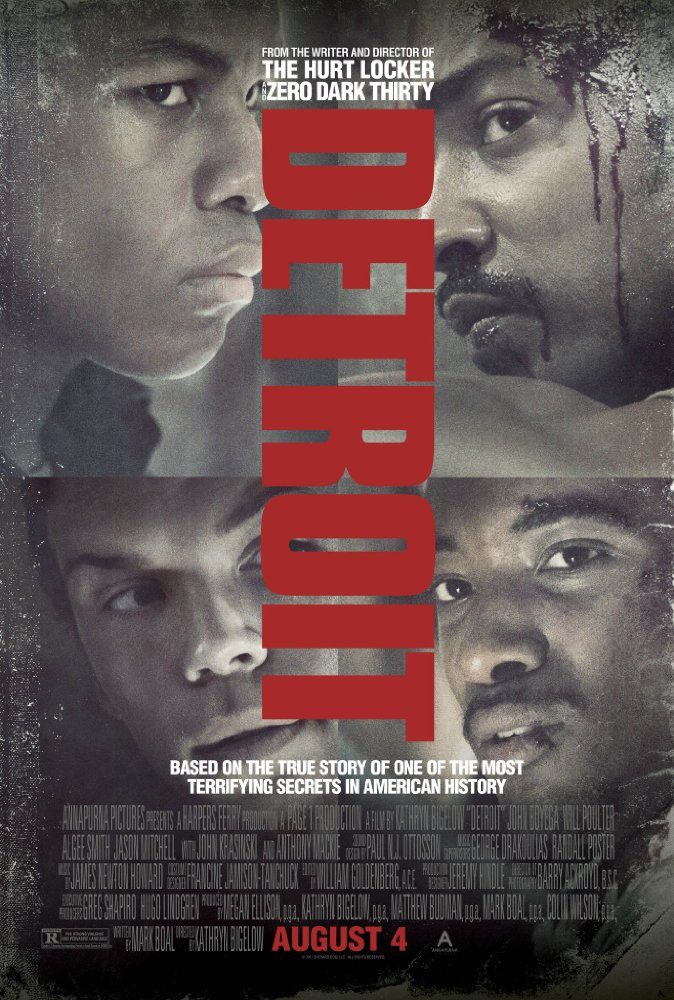Movie Review: Detroit
Kathryn Bigelow’s summer 2017 historical drama film “Detroit” is a fascinating historical look at the tension during the 1967 Detroit riots. The film highlights what caused the violence and destruction and why the police were so aggressive toward suspects.
Despite the film doing a commendable job at bringing the audience into why the Detroit riots happened when they did, for large portions of the film it is often a jumbled mess of racial slurs, police brutality, angry mobs, flying objects, and random individuals rioting.
The film does do an appreciable job at teleporting the audience back into the year 1967 in the city of Detroit. Ernie Harwell is heard broadcasting a Tigers game on the radio.The Motown music style is seen and heard multiple times during the film; both as a backing track and live in concert. Also, the film plays actual radio news reports and television reports from when the events were happening, while visualizing what it was like to live in the city during this time period.
Once Bigelow sets up the focus of the plot by giving background to the main events and painting the picture as to what it was like to live in the city during this time, the main story takes a scary directive.
An ample amount of the film is spent with African American males having their heads pressed against a wall and being interrogated in the same room for seemingly hours. The police (as depicted by the film) used wholly unjustified force toward the suspects without respecting their civil rights at all.
Throughout this portion of the film, suspects are beaten, threatened, shot, assaulted, and even murdered. The officers use racial slurs at the men, and accused the women that they’re with (who were Caucasian) of being prostitutes.
The entire powder keg was lit after a police raid on an unlicensed club on the night of July 23, 1967. They did it in a very public manner, bringing attention to the suspects who were being arrested for operating and drinking at an unlicensed club.
Citizens who were in the area realized what was happening and became enraged. Once all of the people who were at the club were arrested, they hurled debris at the police as they drove away.
Feeling that this was not enough for the perceived injustices, the angered witnesses started breaking windows of nearby shops, which then led to them starting fires in said shops.
The rioting and looting was officially under way.
Three days passed as the riots continue, leading to Governor George Romney to call in the National Guard to Detroit in order to restore order.
The main character of the story is Larry Reed (played by Algee Smith), a performer in the rhythm and blues group The Dramatics. Reed was going to perform at the Music Hall one night during the riots, when suddenly a police officer comes in and notifies the manager that he needs to tell his crowd to go home.
With his group on their way home on a bus, they witness the riots firsthand and are forced to get out of their bus due to the violence and police blockade. Reed is separated from the group and flees with his friend Fred Temple to safety at the nearby Algiers Motel.
After booking a room, Reed and Temple decide to go mingle near the pool, where they introduce themselves to two white women. These women take them upstairs to get food at another room, where Carl Cooper is cooking.
While in this room, Cooper pranks the guests with a toy gun by acting like he is going to shoot his friend over a dispute. It is revealed quickly that he was joking, but Cooper also tells the guests he has a disdain for police and what is going on in Detroit at the time.
Later, after the women, Reed and Temple leave, Cooper foolishly fires his toy gun toward the police who were stationed outside. The police mistake his repeated firing for sniper fire and raid the building, where Cooper tries to escape and is gunned down when trying to leave.
The police (not knowing it was Cooper who fired at them), start interrogating the suspected snipers. They line the men up one by one facing the wall; intimidate them with racial slurs and threats, while brutalizing them with the ends of their weapons.
Some suspects escape, others are killed; all of them are physically abused. Eventually, starting to fear for their well-being, the police let the remaining suspects go, provided they agree to forget about everything that happened.
Reed gets the message loud and clear and runs away when he is told, Temple however says he sees a dead body when asked and is gunned down with multiple gunshots.
The three police officers are eventually tried in court after two out of the three confessed, but their confessions were ruled inadmissible by the judge and they are found not guilty. All of them never served on the police force again and one of them was ruled to be civil responsible for a murder.
Detroit fulfills the stunning task of showing the complete terror the suspects were in from the police officers that night. It additionally does a fantastic job of portraying how the police treated and felt about African American suspects during this time period and how using excessive force was no problem at all for them.
However, the film admits to dramatizing some events at the motel because facts around the Algiers murders were never conclusively established in a criminal proceeding.
Detroit is worth seeing, especially if you’re from the area. It is a great history lesson into one of the worst events in Michigan history, while providing a taste of the 1960s era in Detroit. Nevertheless, the film does get long winded at points and goes off into seemingly unnecessary tangents.








